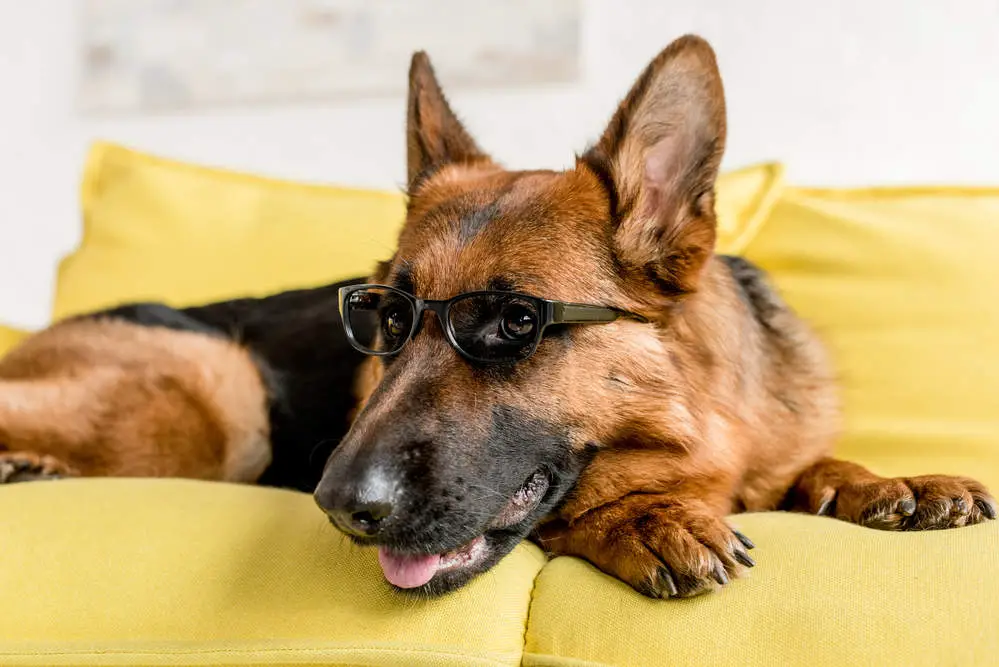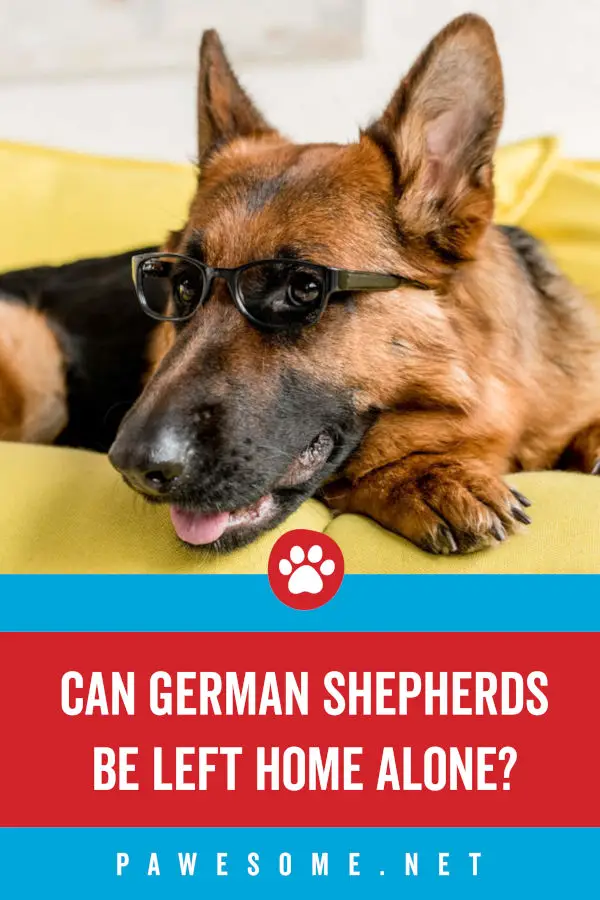
If there is one thing your German Shepherd absolutely loves, it is being around you and your family. A people’s dog, he needs companionship and being left alone for long periods of time, for more than 8 hours a day or more, is an absolute no. He needs to answer nature’s call, for one. Being bored, he may start becoming destructive or display problematic behavior, barking all day long, chewing up your couch or digging.
Unfortunately, you cannot always do the right thing. Though even you may not want to leave your darling pet alone for long periods of time, work or some emergency can necessitate leaving your pooch behind. It is not easy but there are ways to make him comfortable during your long absence.
The Loyal Friend
One of the defining characteristics of a German Shepherd is her loyalty and willingness to defend her human friend to death. This courageous breed has a strong and muscular body, a noble bearing and evident confidence. She can also be aloof and take time to form friendships. But when she does, it is for life.
Being a guard dog, it is natural for your German Shepherd to be anxious about your safety and can lead to boredom as well.
A Bored Dog
Yes, just like humans, your pet too can feel bored. But unlike us, he cannot do anything to alleviate this boredom.
The other is separation anxiety. Your dog can display aggressive, destructive and reactive behavior if she starts feeling anxious about being left alone. Even a warm and comfortable home environment may not alleviate it. If she had been abandoned before, this anxiety will be even more evident. She can become scared and sad and whine and howl all day, disturbing the neighbors.
But it is not just negative experiences that cause separation anxiety. Young puppies that have been the center of attention in the early weeks in their new home, pampered and spoiled, can also find being left alone hard to understand and handle.
Along with love, your pup needs training to help him outgrow separation anxiety with time. Otherwise, his destructive behavior can aggravate a sense of guilt and increase depression. If you are unable to change his behavior, get a trainer.
Factors to Keep in Mind
Age
If you have to leave your German Shepherd alone, you must keep his age in mind. The puppy cannot hold the bladder for very long and this will add to the anxiety when you leave him alone. More than a couple of hours during the day will make him restless and don’t be surprised if your floor is messed up when you return.
If your dog is at least a year or older, nature’s call may not be a point of concern if he is well trained and if you are gone for four to six hours.
History
If you got your German Shepherd when she was a puppy still, leaving her alone may be less problematic if you have trained her well. But if she is a rescued pet, then her past experience will be an added factor to consider.
More Than One
If your German Shepherd is one among many pets you own, it will depend on how well he gets along with the rest and if the others are smaller and vulnerable. If he is friendly with the others, then he may adjust to your absence a little better. If not, then it can aggravate problems.
Safe Home
The German Shepherd is a working dog, strong and muscular. If you have delicate china and curtains and couches, you never know what you will come back to. He can pull down curtains, dig under fences and massacre couches. It is damage that will cost you quite a bit, true, but it can also be dangerous for your pet who can end up hurting himself.
Related: Are German Shepherds Good with Cats?
A Stimulating Environment
Your athletic pet needs to keep himself active and busy to burn off his energy and to feel useful and appreciated. Here are a few things you can do to help your pet cope with the alone time at home when you are gone:
Tire Him Out
If your pet has expended his energy for the day and would like to rest, then your presence or absence may matter less to him. Make time to play with him, take him for a long walk or run so that he takes a leisurely nap till you return.
If you are unable to spare time, you may find dog sitters and walkers in your neighborhood willing to do it on your behalf.
One of the benefits of having someone else walk your dog is that he can form a bond with another human besides you and feel less insecure in your absence. You also provide employment and income to someone who can use it while helping you out.
You may also leave your pet in a daycare for pets once or twice a week so that he has a routine that does not involve you and there is less dependence.
Distractions and Diversions
Be creative and hide toys and treats for your pooch to discover in your absence. This will keep her busy, make her feel important, give her the joy of discovering and keeping her entertained. Playing music that your pet likes can have a calming effect. Also keep changing and rotating toys to add excitement to her time at home.
Connect Remotely
Technology has not only changed the way we live and do things but also how we interact. You can leverage some remote interactive toys that let owners and pets connect and communicate. You can video conference with your pet and also monitor to make sure he is safe.
A Safe Nook
Create a space where your pooch feels warm and safe. Dog crates are a topic of much debate as some consider it cruel. Caging your dog is, but providing a space where he feels safe and protected by introducing it properly will do the trick. Like a den, this can be his go-to space when he is feeling lost and lonely. If he uses it when you are around, he will not feel penned-in in your absence.
Remember not to use the crate as punishment but create a fun space that is comfortable and has his favorite toys and treats, food, water and soft bedding. Train him to be there by letting him in and walking away for a few minutes. Gradually increase the duration of your being away and every time you return, praise and shower love.
If your house has a yard, let him also have access to that. Leave some toys there for him to play.
When you are at home, let him do his own thing and don’t spend all the time with him so that he knows how to keep himself entertained.
Remain Calm
Knowing you are going to leave your darling alone for a long time is not easy for you either and it is natural for you to feel stressed and anxious as well. Your pet can sense it very well, especially a sensitive breed like the German Shepherd that has protective genes in her DNA. This can upset your pooch more.
It is important that you are masterful, calm and walk out of the door as if it is the most normal thing on earth. It really is, you are coming back in the evening after all. So do not let your emotions and worries get the better of you. Act normal and do what you need to do. Do not turn back or keep checking on him before you finally drive away.
Try Dropping In
If you can, it is ideal to make a visit home during lunch time or any breaks you may have. You and your family members can take turns to do this. This will be reassuring for you and your pooch.
Though your doggie can hold his bladder for a few hours, it is healthier for him to relieve himself at least two to three times a day. During weekends when you are at home, observe how many times he pees in a day so that you can time yourself to suit his needs.
Check out if your workplace has a pet-friendly policy and take advantage of that.
Related: How High Can a German Shepherd Jump?
What Works Best
Our lives are such that we have to make a living or go to school. This takes us away for long hours and making a quick dash home in between may be impossible. It is hard to make your darling German Shepherd understand that you have to leave him alone, that you are safe and that you are not abandoning him.
It is also important that you help him deal with boredom and loneliness by creating an environment that stimulates him or one that calms him down. This will depend really on how well adjusted and trained your pet is.
If you and your family members can take turns during the week to check in on him, that would be great. Have a pet sitter, if needed, to mind him and take him out for walks.
Understand your pet and develop a routine that works best for him. He is your best friend, no doubt, he needs you to be his too.

